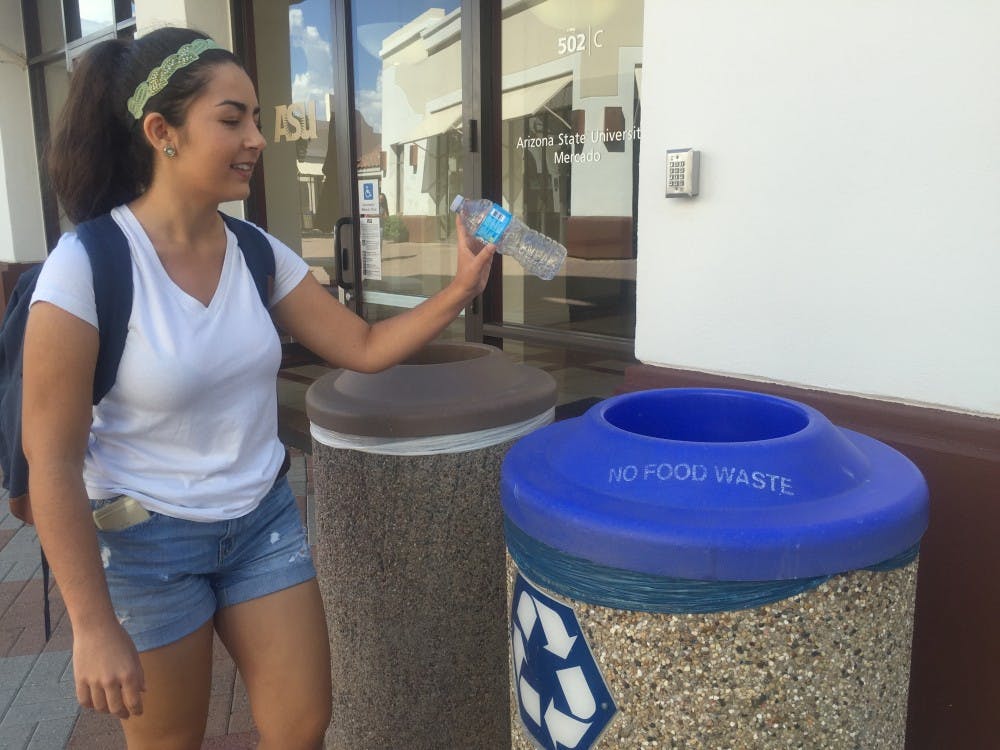For ASU's Zero Waste program, reducing the University's waste is less about recycle bins and compost and more about outreach.
According to Zero Waste program coordinator and ASU graduate Katie Schumacher, Zero Waste is a diversion program and department that oversees the University’s goal to reduce the total amount of waste sent to the landfill by at least 90 percent.
“As our University grows, so does our waste footprint,” Schumacher said. “The impact that our University is having and how can we be a model institution for ways to divert waste is really one of (the program’s) big driving points.”
What began as ASU's recycling club many years ago, the Zero Waste program has slowly evolved to lead the University's waste diversion.
While the program has already expanded the initiative across all four campuses — and provided the necessary bins to divert materials — Schumacher said the next task involves more of a cultural shift.
Schumacher said they currently have all the resources to make an impact; however, they need student involvement to make it a reality. Student involvement in the Zero Waste initiative can be achieved in a multitude of ways, she said, primarily by familiarizing themselves with how to recycle on campus.
Zero Waste makes this easier by providing images on receptacles around campus to help people associate which materials and common products go in the different bins. Their website and social media accounts also provide reminders about how to dispose of trash.
Which item doesn't go into the blue recycling bin on campus? Paper, liquid or metal? There are hints on the graphic! pic.twitter.com/nb1EjZbcG9
— Zero Waste at ASU (@ZeroWasteASU) August 24, 2016
If students or staff are ever unsure about what can and cannot be recycled, Schumacher recommends, “when in doubt leave it out,” and reach out to Zero Waste to find out whether or not an item can be diverted.
The organization's outreach has expanded to also include the Zero Waste ambassador program, which allows for student organizations to receive funding in exchange for doing ambassador work. This could include going to University events, such as tailgating and handing out recycling bags or teaching people about how to recycle on campus.
Schumacher said a lot of the ambassador work revolves around athletics. During games, the ambassadors encourage attendees to recycle common items like disposable plastic bottles, wrappers and flyers.
However, Schumacher said the most effective way to reduce waste is to simply be aware of one's own personal waste.
“We all play a role in a zero waste goal because we are all trash producers, we are all consumers of material and we have the ability to choose to purchase reusable items,” she said.
Marketing sophomore Berenis Reyes reduces her own personal waste by recycling every chance she gets, carrying a reusable water bottle and choosing compost to ensure nothing ends up in the trash.
Reyes has had a passion for going green since high school and has carried the interest with her to ASU.
"Almost everywhere on campus that there is a trash can, there is also a recycling bin, so I just make sure to use the recycling whenever my waste is recyclable, which it usually is," Reyes said.
Schumacher said Zero Waste would love to develop more of a volunteer involvement, as well as receive communication from students and the community.
“We are a large institution," Schumacher said. "So we have an ability to really make an impression on our surrounding community by the statements we are making and the actions we are taking towards sustainable development.”
Schumacher said that as a large institution, ASU has the power to influence the surrounding community.
“Students lead a lot of action on campus, and this is a great way for students to be the leaders of a lot of positive action," she said.
Zero Waste is not the only program on campus that takes initiative in reducing waste on campus, however. All four campuses have clubs that focus on thinking green, with mentalities of reducing, reusing and recycling.
According to Undergraduate Student Government Downtown Vice President of Policy Jimmy Arwood, the USGD is currently working on developing involvement with other clubs, like Zero Waste on campus.
Arwood, formally a sustainability major, holds a special place for the initiative going back to his childhood because his father, also named Jimmy Arwood, was Director of Energy under both Janet Napolitano and Jan Brewer.
Arwood said USGD hosted events in the past geared toward recycling and is interested in carrying them on this year.
"Essentially, students were able to bring in recycling materials, and they would be able to get something in return for that," Arwood said. "So that's definitely something that we are looking into again this year."
Reach the reporter at gbachara@asu.edu or follow @gabriellabachar on Twitter.
Like The State Press on Facebook and follow @statepress on Twitter.




